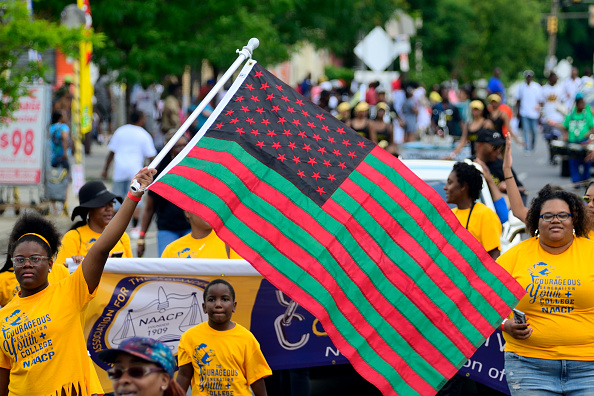OP-ED: What Juneteenth Means to Me
A Pan-African flag flies from Black Lives Matter Plaza overlooking the White House on Juneteenth to mark the liberation of slavery in 1865 on June 19, 2020, in Washington, D.C. | Source: Michael A. McCoy / Getty
I often have conflicting thoughts about Juneteenth and all that it represents. While I currently live in Central Texas, I was born and raised in Detroit. Prior to coming to Texas, I had not heard much about Juneteenth. But I observed that the mindset of African Americans growing up in the 60s in Detroit vs. those in Central Texas was different.
Growing up in Detroit, there was an obvious sense of defiance, unrest and anger with the racial issues that were prevalent in the area and beyond. From those I encountered when I first got to Central Texas, there seemed to be a sense of gratitude through submission and acceptance through silence. There was also suppressed anger about racial issues. I’ve seen a significant shift over the last 10 years in Central Texas, where people are more vocal about race and the need to eradicate racism.
For many people in Texas, Juneteenth is seen as an Independence Day of sorts. It is celebrated as such by African Americans predominantly. But, it is still very much an unknown event in history to many African Americans and Anglo Americans. Although our history has been difficult, I have mixed emotions when I hear African Americans, particularly those in Texas, say this is “our” Independence Day. I understand the sentiment of wanting something that is ours. But I think it’s important that we continue to look for ways to learn and grow together.
When I hear people or groups promote celebrating Juneteenth and NOT Independence Day, because it’s “our day,” I think of the days of “separate but equal.” That mindset without informed intentionality, in my opinion, is very dangerous and can draw an even bigger divide. In fact, we can do both without minimizing the struggle of Black Americans.
Should we celebrate Juneteenth? Definitely! Should we also recognize that this and other events in history can be indicative of systemic racism? Absolutely! I believe our celebrations should include the joy of community, family and freedom. I also believe that these celebrations should be used as a platform for knowledge, education and civic involvement. This will help ensure that we are not left out again, or the last to know again. More importantly, this also helps us to promote the importance of having a seat at the table before critical decisions are made and not suffering after the fact.
As I reflect on Juneteenth, two old sayings come to mind: “I don’t know what I don’t know” and “You can’t teach what you don’t know.” These simple phrases speak volumes. Our job as a community is to support the education of our youth, ensuring they are aware of our past and present as well as our hope for the future.
Juneteenth is an invitation to continue learning about our history while celebrating the possibilities of tomorrow.
Darlene Alfred is a United Women in Faith Board Member from the Central Texas Conference.
SEE ALSO:
OP-ED: Juneteenth, Father’s Day And The Black Male Narrative: Why The Truth About Jan. 6 Matters

